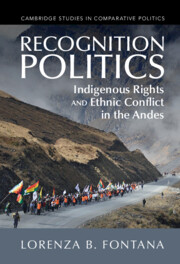Book contents
- Recognition Politics
- Cambridge Studies in Comparative Politics
- Recognition Politics
- Copyright page
- Dedication
- Contents
- Figures
- Tables
- Acknowledgements
- Acronyms and Abbreviations
- Introduction
- 1 Recognition Conflicts
- 2 Citizenship and Development in the Andes
- 3 Class and Ethnic Shifts
- 4 Recognition for Whom?
- 5 The Physical Boundaries of Identity
- 6 Unsettled Demographies
- 7 Struggles for Inclusion and Exclusion
- 8 Rethinking Recognition: What Are the Implications for Identity Governance?
- References
- Index
- Other Books in the Series (continued from page ii)
2 - Citizenship and Development in the Andes
Published online by Cambridge University Press: 05 January 2023
- Recognition Politics
- Cambridge Studies in Comparative Politics
- Recognition Politics
- Copyright page
- Dedication
- Contents
- Figures
- Tables
- Acknowledgements
- Acronyms and Abbreviations
- Introduction
- 1 Recognition Conflicts
- 2 Citizenship and Development in the Andes
- 3 Class and Ethnic Shifts
- 4 Recognition for Whom?
- 5 The Physical Boundaries of Identity
- 6 Unsettled Demographies
- 7 Struggles for Inclusion and Exclusion
- 8 Rethinking Recognition: What Are the Implications for Identity Governance?
- References
- Index
- Other Books in the Series (continued from page ii)
Summary
In Latin America, rural communities have historically represented a challenge both for the nation-building process and for countries’ development strategies. How should the indigenous population be incorporated into the nation, while moderating the potentially destabilising tensions rooted in persistent ethno-cultural differences? And how can rural households become active contributors to economic development without triggering subversive forces that would threaten the stability of the national economy and its involvement in regional and global markets? To address these questions, since independence Latin American states have adopted a variety of strategies, underpinned by different, and sometimes opposite, visions of citizenship and development. These strategies have had concrete effects in redefining ethnic and class boundaries, shaping at the same time relationships between the state and social groups and among social groups themselves. Since the early twentieth century, citizenship and development regimes have followed somewhat cyclical patterns, oscillating between the dyadic forces of separation and assimilation, social inclusion and differentiation.
Keywords
- Type
- Chapter
- Information
- Recognition PoliticsIndigenous Rights and Ethnic Conflict in the Andes, pp. 56 - 70Publisher: Cambridge University PressPrint publication year: 2023

